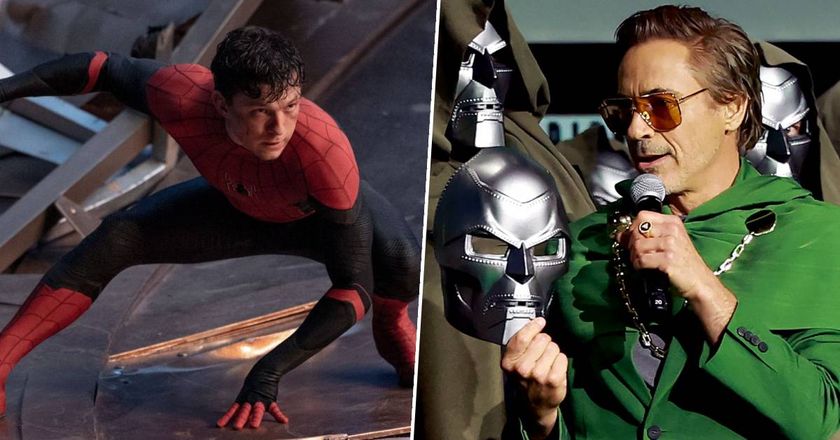We Happy Few is urban survival mixed with powerful psychedelics
In the aftermath of World War I, the city of Budapest, Hungary was wracked by a tragic string of suicides. So widespread were these deaths they earned Budapest the nickname 'City of Suicides' by its own citizens. To curb this mortifying trend, a professor and a hypnotist teamed up to form the 'Smile Club,' and what began as a joke quickly grew in popularity as more and more people signed on to learn the secrets of the 'Roosevelt smile' and the 'Mona Lisa smile.' At its most extreme, the Smile Club employed crude masks and surgical tape to help members achieve that perfect - if not nightmare-inducing - grin.
This dichotomy of blissful jubilance and crippling melancholy is at the heart of We Happy Few, the latest from Contrast developer Compulsion Games. Lurking under the game's bright, bubbly vision of 1960's England is a populace hopelessly lost in chemically-induced denial. Everyone is getting high on drugs - specifically Joy - all the time. You are one of the few to go lucid, and must escape this city of Wellington Wells before society collapses around you.
If you weren't lucky enough to play the game at PAX East earlier this year, know that We Happy Few is a first-person survival game in the same vein as Rust or The Forest - but without the usual tropes. The game is procedurally generated, but there are no zombies, nor are you lost in any woods. Instead, you're a citizen out of place in 'normal' society, surrounded by a technicolor asylum predicated on drug abuse and mandatory revelry. Wellington Wells is your forest; its doped-up denizens your unrelenting horde. Only by carefully managing hunger, thirst, and social camouflage will you hope to escape this cobblestone prison.
After making its debut, We Happy Few drew comparisons to everything from BioShock to The Stepford Wives - albeit with a healthy dose of psychedelics. The BioShock references clearly stem from Wellington Wells: a stylized, ideological utopia run amok. And The Stepford Wives is felt in how everything is so uniformly creepy.
With a playable version already completed, Compulsion has turned to Kickstarter to help polish off development. I caught up with creative director Guillaume Provost and art director Whitney Clayton to discuss what makes this game tick, specifically paranoia, dystopian worlds, and '60s mod fashion.
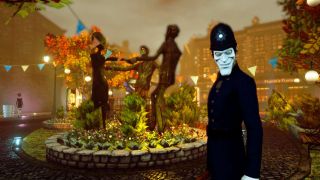
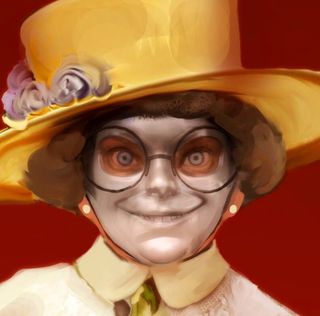
Uncle Jack's mask is actually a millimeter-and-a-half latex molding that had to be recreated every day of filming - which somehow seems weirder.
Smacking around the locals with a frying pan or cricket bat is key to surviving We Happy Few, but one of your best weapons is simply blending in. Wellington Wells has eyes everywhere, bearing down on you from all directions. Unnecessary running, jumping, and home invasions will signal to the townsfolk that you're off your meds. And they don't like people who are off their meds. "There's a definite tipping point where, once one citizen gets angry at you, it spreads like wildfire," said Provost. "When that happens you basically have to run for your life as there are suddenly a lot of angry people paying very close attention to you."
Since Wellington Wells is basically a stoner's paradise, getting high is an excellent way to go incognito. The designer drug of the day is Joy, an insidious cocktail designed primarily to help consumers forget - as Provost puts it - something terrible they did in their past. It also has the added benefit of making the otherwise foggy, dreary world of We Happy Few light up like a Christmas tree. Colors are brighter, the sky is clearer, and you might even spy a butterfly dancing across your vision.
Sign up to the 12DOVE Newsletter
Weekly digests, tales from the communities you love, and more
It is also a lie. Consuming Joy can make you less suspicious to those around you, but take too much and you'll overdose. In the PAX East demo, overdosing wastes a day's worth of time, time you desperately need to escape from Wellington Wells. Conversely, if you go cold turkey and don't take any Joy, your character will suffer from symptoms of withdrawal, which can make you seem all the more suspicious.
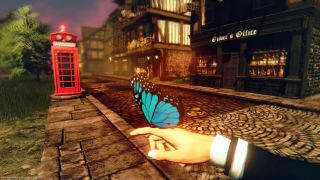
We Happy Few’s vision of the '60s may be bleak, but it doesn't look like your typical dystopian post-apocalypse. It's 1984 by way of Dr. Seuss, and this duality penetrates every aspect of the game. The people can go from happy to violent in an instant. Your view of the world oscillates between lucid and high. Everything here is one big mashup. As art director Clayton explained, "In '60s England you saw everything from old Victorian to mod fashion, old and new smashed up against each other in such stark contrast. Amplifying that contrast has been an interesting challenge."
Even the buildings themselves are a mixture of differing styles. "We push and pull and exaggerate the shapes of buildings, and then put realistic textures on top of those shapes," said Clayton. "It's a style influenced by stop motion in terms of how shapes are exaggerated and the surrealness you can get from that."
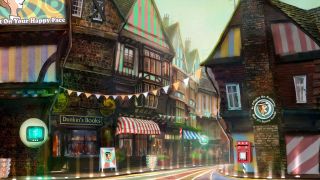
"The '70s are more the decade for drugs, but when you look at the fashion industry in the '60s, well, I don't know what the hell they were on." - Provost, on fashion
Because the people of Wellington Wells are constantly stoned, and their city looks like a set from Austin Powers, Compulsion felt they needed an authority figure to help maintain order. Enter Uncle Jack, the voice of the people, their spiritual liege. Jack enforces his brainwashing doctrine not through fear or intimidation, but through silly television appearances and a big ol' smile.
He is also one of the main sources of paranoia throughout the game, his face plastered across the numerous security monitors littering Wellington Wells. "I can tell you the monitors do turn and look at you in the game," Provost teased, "but whether or not [Uncle Jack] is actually speaking to you is for you to interpret."
Uncle Jack is played by actor Julian Casey (shown below). As the developers explained, filming Casey on an actual set with a professional crew was a completely new experience, but well worth the effort. "The mixed media stuff is sweet," said Clayton. "It's like 'Why not?' Our style is kinda surreal and experimental anyway, so why not try something different? At our size it’d be a waste to do predictable things."
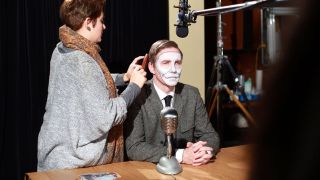
"Trying new things is one of the reasons why most of the people who work here are proud to be on the team," Provost continued. "We don't always get them right, but when we get them wrong we're trying to get smarter. There are certain decisions we've made on [We Happy Few] that have made it harder - just tackling the entire social ecosystem and making it interesting is a big undertaking unto itself - but I think that's what makes it fun to go to work every day."
That enthusiasm shines through in We Happy Few's surrealist mashup of style and tone. "I like the happy-but-also-creepy interplay we have," said Provost. "We want a sense of unease in the player where they understand things are not as they seem. It's been a great challenge, but also a fun one."
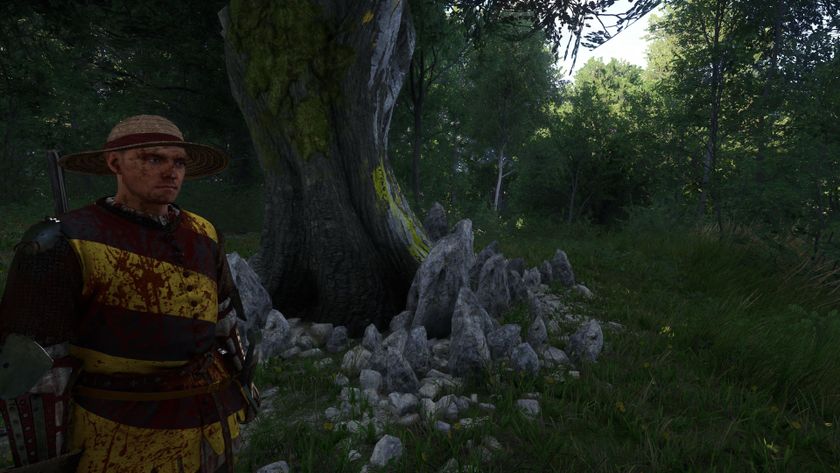
Kingdom Come: Deliverance 2 has turned me into a Bohemian Batman who murders bandits in their sleep, and it's all because of some dead sheep
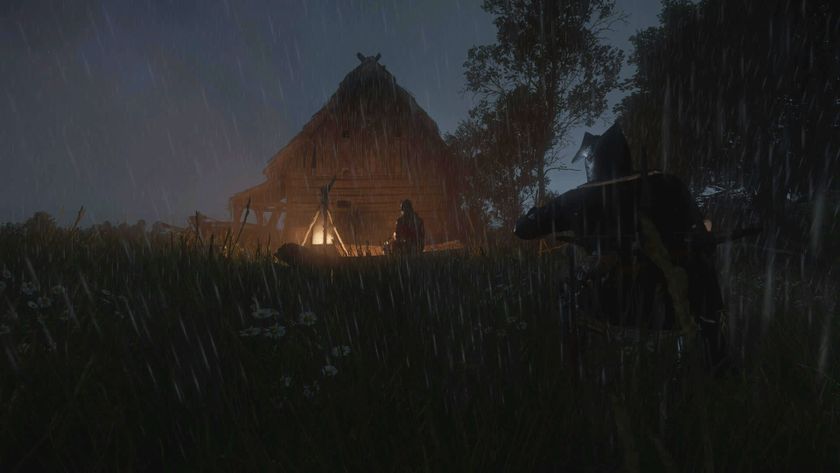
Kingdom Come: Deliverance 2 devs chased down a 600-year-old star map for the sake of historical accuracy and immersion, and it should "be useful for Hardcore Mode"
Most Popular





